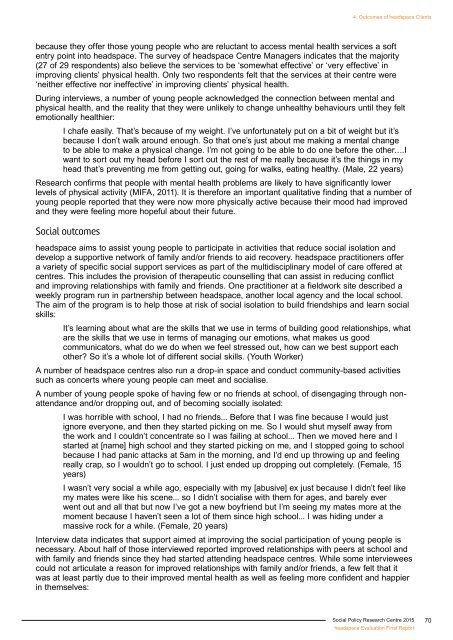Is headspace making a difference to young people’s lives?
Evaluation-of-headspace-program
Evaluation-of-headspace-program
Create successful ePaper yourself
Turn your PDF publications into a flip-book with our unique Google optimized e-Paper software.
4. Outcomes of <strong>headspace</strong> Clients<br />
because they offer those <strong>young</strong> people who are reluctant <strong>to</strong> access mental health services a soft<br />
entry point in<strong>to</strong> <strong>headspace</strong>. The survey of <strong>headspace</strong> Centre Managers indicates that the majority<br />
(27 of 29 respondents) also believe the services <strong>to</strong> be ‘somewhat effective’ or ‘very effective’ in<br />
improving clients’ physical health. Only two respondents felt that the services at their centre were<br />
‘neither effective nor ineffective’ in improving clients’ physical health.<br />
During interviews, a number of <strong>young</strong> people acknowledged the connection between mental and<br />
physical health, and the reality that they were unlikely <strong>to</strong> change unhealthy behaviours until they felt<br />
emotionally healthier:<br />
I chafe easily. That’s because of my weight. I’ve unfortunately put on a bit of weight but it’s<br />
because I don’t walk around enough. So that one’s just about me <strong>making</strong> a mental change<br />
<strong>to</strong> be able <strong>to</strong> make a physical change. I’m not going <strong>to</strong> be able <strong>to</strong> do one before the other….I<br />
want <strong>to</strong> sort out my head before I sort out the rest of me really because it’s the things in my<br />
head that’s preventing me from getting out, going for walks, eating healthy. (Male, 22 years)<br />
Research confirms that people with mental health problems are likely <strong>to</strong> have significantly lower<br />
levels of physical activity (MIFA, 2011). It is therefore an important qualitative finding that a number of<br />
<strong>young</strong> people reported that they were now more physically active because their mood had improved<br />
and they were feeling more hopeful about their future.<br />
Social outcomes<br />
<strong>headspace</strong> aims <strong>to</strong> assist <strong>young</strong> people <strong>to</strong> participate in activities that reduce social isolation and<br />
develop a supportive network of family and/or friends <strong>to</strong> aid recovery. <strong>headspace</strong> practitioners offer<br />
a variety of specific social support services as part of the multidisciplinary model of care offered at<br />
centres. This includes the provision of therapeutic counselling that can assist in reducing conflict<br />
and improving relationships with family and friends. One practitioner at a fieldwork site described a<br />
weekly program run in partnership between <strong>headspace</strong>, another local agency and the local school.<br />
The aim of the program is <strong>to</strong> help those at risk of social isolation <strong>to</strong> build friendships and learn social<br />
skills:<br />
It’s learning about what are the skills that we use in terms of building good relationships, what<br />
are the skills that we use in terms of managing our emotions, what makes us good<br />
communica<strong>to</strong>rs, what do we do when we feel stressed out, how can we best support each<br />
other? So it’s a whole lot of different social skills. (Youth Worker)<br />
A number of <strong>headspace</strong> centres also run a drop-in space and conduct community-based activities<br />
such as concerts where <strong>young</strong> people can meet and socialise.<br />
A number of <strong>young</strong> people spoke of having few or no friends at school, of disengaging through nonattendance<br />
and/or dropping out, and of becoming socially isolated:<br />
I was horrible with school, I had no friends... Before that I was fine because I would just<br />
ignore everyone, and then they started picking on me. So I would shut myself away from<br />
the work and I couldn’t concentrate so I was failing at school... Then we moved here and I<br />
started at [name] high school and they started picking on me, and I s<strong>to</strong>pped going <strong>to</strong> school<br />
because I had panic attacks at 5am in the morning, and I’d end up throwing up and feeling<br />
really crap, so I wouldn’t go <strong>to</strong> school. I just ended up dropping out completely. (Female, 15<br />
years)<br />
I wasn’t very social a while ago, especially with my [abusive] ex just because I didn’t feel like<br />
my mates were like his scene... so I didn’t socialise with them for ages, and barely ever<br />
went out and all that but now I’ve got a new boyfriend but I’m seeing my mates more at the<br />
moment because I haven’t seen a lot of them since high school... I was hiding under a<br />
massive rock for a while. (Female, 20 years)<br />
Interview data indicates that support aimed at improving the social participation of <strong>young</strong> people is<br />
necessary. About half of those interviewed reported improved relationships with peers at school and<br />
with family and friends since they had started attending <strong>headspace</strong> centres. While some interviewees<br />
could not articulate a reason for improved relationships with family and/or friends, a few felt that it<br />
was at least partly due <strong>to</strong> their improved mental health as well as feeling more confident and happier<br />
in themselves:<br />
Social Policy Research Centre 2015<br />
<strong>headspace</strong> Evaluation Final Report<br />
70


